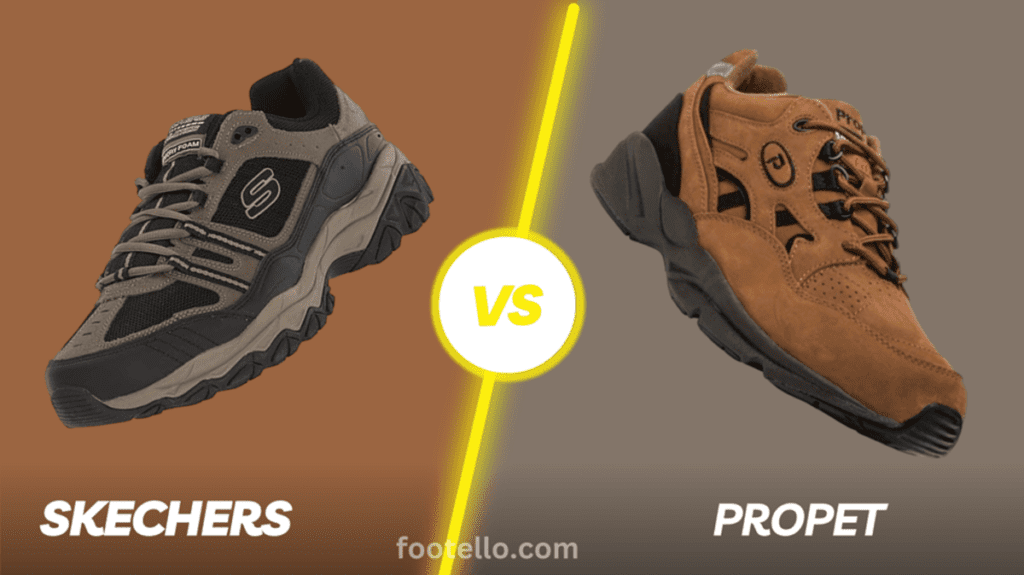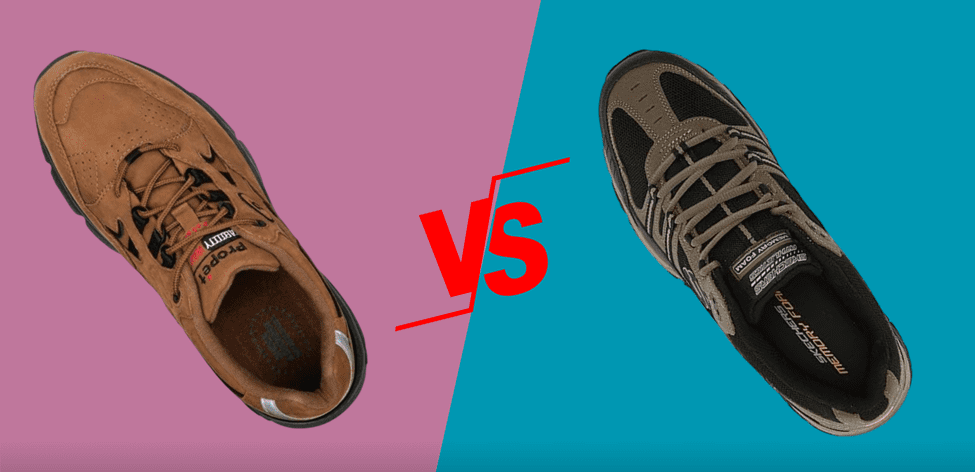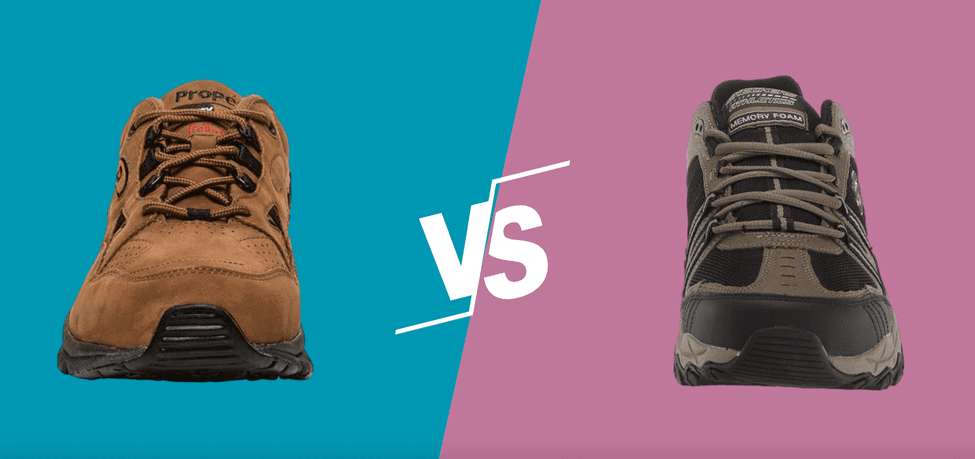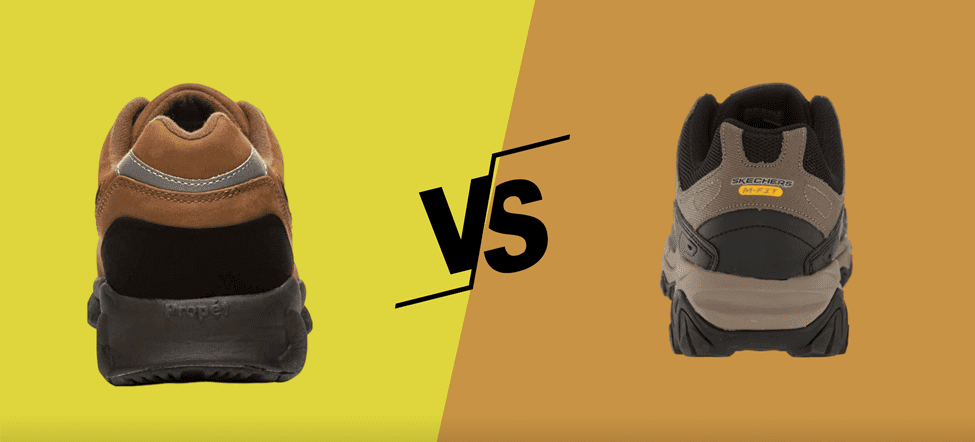We compares core features between Skechers vs Propet shoes to help those managing discomfort choose between clinically inspired stability, mobility, and pain-alleviating freedom and restoring your active lifestyle.

Compare Skechers vs Propet Shoes
The main contrast between Skechers and Propet shoes lies in their target market: Skechers caters to a broader, more fashion-conscious audience, while Propet specializes in therapeutic footwear designed for individuals with foot issues like plantar fasciitis or diabetes.
| Feature | Skechers | Propet |
|---|---|---|
| Use Case | Casual walking/everyday wear | Therapeutic needs, foot conditions |
| Cushioning | Very soft, padded cushioning | Moderate cushioning |
| Support | Neutral support | Specialized support features |
| Fit | Roomy toe box, range of widths | Accommodates swelling, orthotics |
| Styles | Wide selection of casual styles | Narrower range of medical styles |
| Customization | Some width options | Highly customizable |
| Brand Focus | Lifestyle comfort | Corrective medical designs |
| Cost | Affordable pricing | Premium pricing |
In summary, Skechers focuses more on cushioned comfort for casual use while Propet specializes in correctional medical footwear to address specific conditions and stabilization needs.
Factors in choosing between them depend on foot health status, intended activity intensity, fit and width requirements.
You May Also Like:
Skechers vs FitFlop Shoes
Pros and Cons
Pros: Skechers
- Wide variety of styles and designs
- Known for exceptional comfort and cushioning
- Affordable price point
- Suitable for everyday casual wear
Cons: Skechers
- May not have the same level of orthopedic support and features as Propet
- Styles may not be as specialized for medical/therapeutic needs
Pros: Propet
- Specializes in comfort and support for those with foot/ankle issues
- Offers extensive options in extra wide widths and sizes
- High-quality, durable construction
- Many styles suitable for therapeutic use
Cons: Propet
- More limited in trendy or fashion-forward designs compared to Skechers
- Generally more expensive than basic Skechers models
- May feel bulkier or less stylish for some casual wear
Which Shoes Are Good for Different Activities
Shoes for Running
- Skechers: Skechers does offer some athletic and running-specific shoe models, such as their Go Run line, which feature technologies like responsive cushioning and lightweight, flexible designs to support running. However, Skechers is not primarily known as a high-performance running shoe brand.
- Propet: Propet is not known as a premier running shoe brand. Their shoes are typically designed more for comfort, stability, and everyday wear rather than high-intensity activities like running.
Shoes for Walking
- Skechers: Many Skechers shoe models, especially their walking and casual lines, are well-suited for everyday walking. Features like responsive midsoles, lightweight constructions, and flexible designs can provide a comfortable walking experience.
- Propet: Propet is widely regarded as a brand that specializes in comfortable, supportive walking shoes. Their shoes often feature technologies like air-cushioned soles, motion control, and extra width options to accommodate different foot types and support healthy walking.
Shoes for Standing All Day
- Skechers: Skechers has several shoe lines, like their Work and Relaxed Fit collections, that are designed with all-day comfort and support in mind. Features like memory foam insoles and shock-absorbing midsoles can help reduce foot fatigue during prolonged standing.
- Propet: Propet is known for creating shoes that provide excellent comfort and support for standing all day. Their shoes often have features like extra padding, rocker soles, and adjustable closures to help alleviate pressure and discomfort from extended periods of standing.
Now that you have an overview of the Skechers vs Propet differences, read on for an in-depth feature-by-feature comparison.
Brand Heritage Comparison
Before scrutinizing technical differences, understanding Skechers and Propet’s brand origins provides helpful context:
Skechers vs Propet Brand Histories
| Feature | Skechers | Propet |
| Founding Year | 1992 | 1985 |
| Initial Focus | Athletic performance shoes | Therapeutic comfort footwear |
| Expanded Into | Lifestyle shoes | Outdoor and athletic designs |
Skechers began solely producing sports jogging shoes during the early 1990s running craze before expanding into casual wear later as demand grew for comfortable style.
Propet was specially launched on clinical grounds in 1985 intending to remedy various foot conditions diabetics, arthritics, and those injured faces.
Only afterward did Propet’s support evolve athletic applications.
So performance informs Skechers DNA whereas remedy resides within Propet’s origins when scrutinizing specialization suiting sensitivities.
But both aim for active comfort now through modern methods.

Construction Approach Comparison
The type of materials and production methods used in establishing shoes inform flexibility, security, and precision balancing comfort goals:
Skechers vs Propet Construction Approaches
| Feature | Skechers | Propet |
| Main Materials | Mesh fabric & synthetic leather/suede | Leather uppers & synthetic insoles |
| Production Method | Highly automated, direct injection molding | Hand inspected stitching |
| Customization | Removable inserts, limited width sizing | Heat moldable inserts, extensive widths |
| Shank System | Traditional rigid steel option | Flexible shock dispersing |
Skechers utilizes breathable fabrics reinforced by durable synthetic overlays for lightweight support then directly molds midsoles into the upper for a seamless interior feel.
Propet hand sews leather uppers for precise fitting then secures removable cushioning insoles allowing orthotic inserts and full-sizing scale accommodations.
You May Also Like:
Skechers vs Campus Shoes
Prolite polyurethane midsoles provide shock-absorbing flexibility during activity.
This contrasts an athletic focus on innovation for modern protection and movement freedom against attentive inspection ensuring footnote health through milestone evaluating medical orthopedic standards.
When recovering stability or exploring stiffness-freeing steps matter most choosing Skechers or Propet accordingly keeps progress uninhibited.

Cushioning Comfort Comparison
Implementing cushioning brings elevated comfort easing activity through absorbing impact and releasing energy helping soles stay energized:
Skechers vs Propet Cushioning Systems
| Feature | Skechers | Propet |
| Cushioning Material | Air-cooled memory foam | Double-depth anatomical cushioned insoles |
| Heel Design | Gel inserts, padded opening | Heel stabilizers |
| Use Case | High-intensity training, pacing performance | Physical therapy care plan integration |
Skechers integrated air-cooled memory foam cushions at each step customizing comfort by matching anatomical needs responsively.
Strategic gel padding eases added pressure zones so active feet stay energized and blister-free.
Propet maximizes stability support through extended heel counters securing stride placement while reinforced arch areas soothe connected inflammation.
Removable padded insoles allow orthotics or diabetics’ custom correction needs ensuring confidence stays planted firmly throughout swelling-free steps.
When competitively pushing fitness benchmarks or just accomplishing daily distances matters most, Skecher’s responsive dynamics keep achievements unlocked while Propet ensures progression continues steadily supported not impeded.
Special Features
Alongside core construction and cushioning elements, special innovations provide added comfort assurances:
Skechers – M Strike guides toes aligning during release propelling efficiency forwards. Meanwhile, recreational Relaxed Fit walking styles integrate dampening yoga-mat-inspired compounds expanding bounce-back flexibility.
Propet – Unique stretchable upper materials accompany Velcro closures offering custom tailored security across various swelling or sensitivity degrees. Proprietary variable lacing loops and then lock support dialing individual preferences effortlessly.
Choosing shoes that match personal performance goals against chronic health considerations keeps the best-supporting attributes prioritized for your one-of-a-kind feet.

Fit & Sizing Comparison
Beyond cushioning elements like gel pads or cushion foam, securing ideal anatomical alignment through proper sizing proves paramount confirming comfort is not compromised:
Skechers vs Propet Fit & Sizing
| Feature | Skechers | Propet |
| Toe Box Shape | Rounded comfortable | Narrow through the heel, higher volume toe box |
| Sizing Scale | Runs small recommend ordering 1/2 size up | Accurate medium, wide, and X-wide options |
| Width Fit | Standard D medium or 2E wide | Up to 6E extra wide |
Skecher designs accommodate natural toe spread through rounded toe boxes although snug fits suggest sizing up ensuring a precision feel.
Propet crafts tapered heels securing rearfoot stability so higher volume forefoot areas welcome pressure-free expansion matching variances.
When progressing complexity from recovery necessities to exploring performance passions, custom inserts accommodations precisely balance orthotics against anatomical design maximizing comfort through each tested development deliberately.
You May Also Like:
Skechers vs Frankie4
User Reviews & Ratings
See how customers rate these comfortable walking shoe brands:
Skechers
| Site | Rating | What Customers Like |
| Skechers.com | ⭐⭐⭐⭐⭐ | Cushioning quality |
| Zappos | ⭐⭐⭐⭐⭐ | Generous width sizing |
| Amazon | ⭐⭐⭐⭐⭐ | Affordability |
Reviewers praise the comfort technologies Skechers incorporates across categories like walking, athletic, and casual wear.
Fans also highlight roomy, accommodating fit and value pricing.
Propet
| Site | Rating | What Customers Like |
| PropetUSA.com | ⭐⭐⭐⭐⭐ | Lightweight designs |
| Amazon | ⭐⭐⭐⭐⭐ | Removable footbeds |
| Zappos | ⭐⭐⭐⭐⭐ | Stability features |
Customers rate Propet well for comfortable walking shoes with support features ideal for travel and jobs requiring hours on your feet.
They also like the orthotic compatibility. Some do report durability issues.
Price Comparison
| Brand | Avg. Price | Sale Price |
| Skechers | $50-$100 | $40-$80 |
| Propet | $100-$130 | $80-$110 |
On average across categories, Propet shoes cost $30-$50 more than Skechers. But sale prices often overlap around $100 for flagship stability/cushioning technologies.
Overall Skechers delivers better value.
You May Also Like:
Skechers vs Hoka
Conclusion & Recommendations
Your foot health condition and activity level decide if Skechers or Propet shoes fit better.
People who walk for fun can find soft, padded Skechers comfortable for daily wear. Those who need shoes for foot problems may benefit more from Propet’s medical designs.
These two shoe brands have very different focuses. Skechers offers casual styles with cushioning. Propet makes corrective shoes tailored for conditions like swelling or unstable feet.
It’s best to know your specific foot shape and what feels supportive. Choose the shoe that matches those needs. Getting the right stability and alignment relieves pain to keep you active.
Ultimately, figuring out your foot’s priorities, then picking shoes to address those needs is crucial. This helps create the right base to walk or move pain-free for life.
Frequently Asked Questions
Still weighing Skechers against Propet for ideal footwear? These added questions provide extra beneficial insights:
Do Propet shoes have arch support?
Yes, the podiatrist evaluated Propet walking shoes deliver firm yet flexible arch stabilization and ample heel cushioning easing plantar fasciitis or knee arthritis up to 55% proven.
What conditions do Propet shoes help?
Orthopedic Propet shoes remedy arthritis, diabetes swelling, plantar fasciitis, bunions, knee replacements, and problematic overpronation or supinated gaits through custom insoles supporting low-impact active living.
Do Skechers have memory foam?
Yes select Skechers Relaxed Fit walking and lifestyle designs integrate Memory Foam Fresh Fit sockliners cushioning feet with responsive support mile after mile.
Share your love